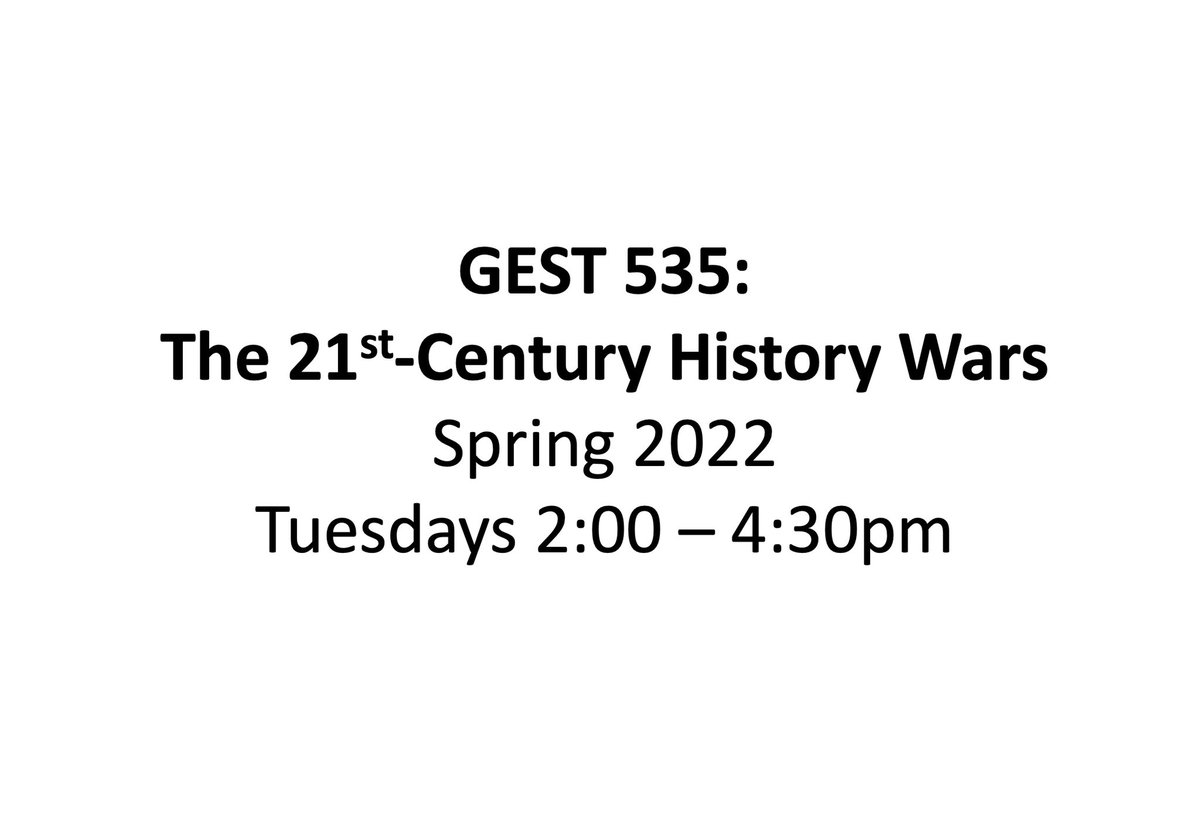
The 21st-Century History Wars
Here’s the reading list for this course I am currently teaching. It’s somewhat preliminary: It’s a new course and changes may occur, depending on where our discussions take us. I’ll also certainly add more primary sources. Follow along at #GEST535

Here’s the reading list for this course I am currently teaching. It’s somewhat preliminary: It’s a new course and changes may occur, depending on where our discussions take us. I’ll also certainly add more primary sources. Follow along at #GEST535


We started with a look at some big-picture takes on the History Wars and a broader reflection on an important question: Why is everybody talking about history? #GEST535 

This week, we looked at some previous iterations of the History Wars, specifically at the conflict over National History Standards in the 90s, and tried to situate the current anti-“CRT”/ education bills in that longer-term context. #GEST535 

In Week 4, a dive deep into the 1619 Project – and would you believe it, we’ll actually read it, discuss it, something that quite a few critics have not done, I’d guess.
In Week 5, a comprehensive look at the reactions to and the debate surrounding the 1619 Project. #GEST535

In Week 5, a comprehensive look at the reactions to and the debate surrounding the 1619 Project. #GEST535


In Week 6, we’ll talk about how (not?) to bring history into the debate over American authoritarianism and discuss: Did it happen / is it happening here? The Fascism Question. #GEST535 

Week 7 will be our last deep dive into the current U.S. history wars – we’re looking at the fight over Confederate monuments and, more generally, the Confederacy in American memory and politics. #GEST535 

In Week 8, we’ll move across the Atlantic and start our exploration of the inter- and transnational dimensions of the History Wars. We’ll start in Belgium, where statues are also falling, and events have been very much intertwined with what has been happening in the U.S. #GEST535 

In Week 9, we’ll look at the struggle over racism and the colonial legacy in the UK #GEST535 

Week 10: Is there something to be learned from the Germans, about how to deal with the “memory of evil,” as Susan Neiman calls it? We’ll focus on her famous book, which will also serve as an entry into the German case. #GEST535 

Week 11: If we want to assess whether or not there is something to be learned from the German “Vergangenheitsaufarbeitung,” the process of “working through the past,” we have to understand it first. In this week, we look at German debates before Reunification. #GEST535 

In Week 12, we explore the debates over whether or not Germany is a “normal” country, and what that means for the way it handles its history, since Reunification: Collective Memory, the Culture of Remembrance, and “Vergangenheitspolitik” since 1989 #GEST535 

And finally in Week 13, we examine the so-called “Catechism Debate” – a fierce fight over how to study, teach, and remember the Holocaust, the legacy of colonialism in German public culture, and the political conflict over national identity and multi-ethnic pluralism. #GEST535 

As you can see, we have already started – Weeks 1-3 are in the books. I’ll post some reflections on the questions we discussed and our main observations and takeaways early next week. After that, there will be weekly updates as we make our way through the semester. #GEST535
Please keep your suggestions and observations coming – they are extremely helpful and so very much appreciated. Once again, I will not be able to answer all the questions or react to all the comments, but I am grateful to everyone who follows along. #GEST535
And, as always, here’s the original #GEST535 thread that contains all the general information on the course, the ideas and questions behind it, and links to all the different spin-off threads I’ll be posting throughout the semester:
https://twitter.com/tzimmer_history/status/1489305230051270665
• • •
Missing some Tweet in this thread? You can try to
force a refresh












